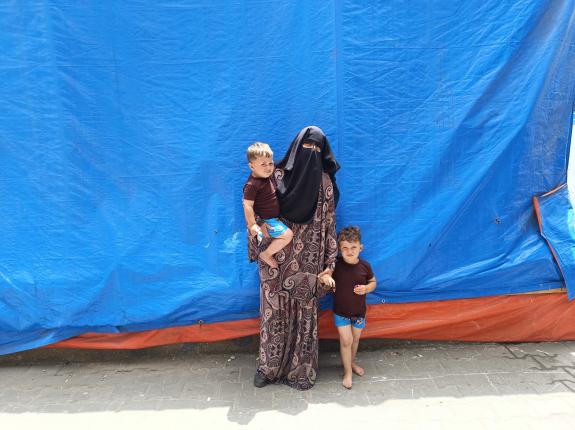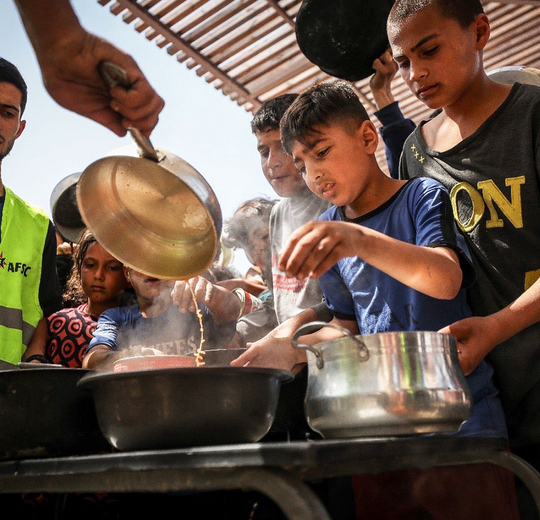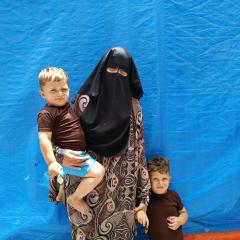My name is Somia Issa Mustafa Saleh, 32 years old, from Jabalia refugee camp in the northern Gaza Strip. My husband was killed by an Israeli sniper while searching for water. I dream of being able to secure a dignified future for my children; they are my husband's trust to me, and they are all I have left in this life.
The day before the war, my family and I celebrated my sister’s wedding. The celebrations lasted for several days leading up to the wedding day, which was Friday, 6 October 2023. After the wedding, I stayed at my family’s home with my children. The war began while I was there, and I still haven’t returned to my home, which was destroyed by the occupation. My husband was killed by an Israeli sniper while searching for water.
My name is Somia Issa Mustafa Saleh, 32 years old, from Jabalia refugee camp in the northern Gaza Strip. I got married five years ago to Abdullah Saleh, and we lived our lives in a humble home in Jabalia camp. We had two children, Ahmed Saleh, four years old, and Adi Saleh, two years old. We lived happily until 7 October 2023.
I couldn’t return to my home after the wedding due to the severe Israeli bombardment on Jabalia camp from the first day of the war. I stayed with my husband and children at my parents’ house in Jabalia camp for 20 days. Due to the intense and violent shelling, which targeted neighbouring houses, we decided to leave.
We fled to Asmaa School in the Shati camp west of Gaza City. We walked on foot for more than 13 kilometres [8 miles] and lived in the school for two weeks. The Israeli occupation forces issued warning leaflets, demanding that we evacuate the school, so we evacuated again. This time, I went with my husband and children to Khan Younis city, south of Gaza Valley. It was considered one of the safe areas, as designated by the occupation force.
We stayed in one of the UNRWA shelters in Khan Younis city for two months. After the first cease-fire ended, the war resumed more intensely, and the Israeli operation began in Khan Younis city. The occupation planes dropped leaflets demanding that we leave the city. The shelling was severe and intense. Some of us managed to leave, but many couldn’t. My husband, my children, and I were among those who couldn’t leave the school. I was afraid for my children because of the severity of the violent shelling carried out by the occupation forces on the city.
On 29 January 2024, the water supply to the school was completely cut off. Our displaced neighbours in the school asked my husband to go up to the roof to check the water because the children and everyone trapped inside the school were suffering from severe thirst.
My husband went up to the school roof, and several hours passed without him coming down. It was already eleven o’clock at night when I climbed up to the school roof to search for my husband Abdullah, but I couldn’t find him. I thought he had come down from the roof without me seeing him, so I left the school and went to the displacement tents west of the city to search for him, but I couldn’t find him.
I searched for my husband until one of the other displaced people informed me that he had been martyred by a gunshot from the Israeli tanks on the school roof. I decided to return to the school to confirm the news. As I climbed up to the school roof, the Israeli artillery started shelling the school and its surroundings heavily. I was shocked by the scene I saw: my husband lying on the school roof amid a large pool of blood, lifeless, shot by an Israeli sniper.
I couldn’t control myself from the shock of the scene. I crawled towards the place where my husband was, amidst heavy gunfire, tied his leg, and tried to pull him down, but I couldn’t. I asked for help from the other displaced people, but due to the intensity of the Israeli shelling, we couldn’t get him down. So I left him on the school roof, and we all left the school for the displacement tents.
The journey out of the school was harsh and extremely dangerous. Gunfire was continuous and shelling was everywhere. We left amidst destruction, Israeli artillery fire, and airstrikes, but I had to leave to protect my children’s lives. I lost my husband as a martyr, and I didn’t want to lose my children to the Israeli bombardment.
I spent three days in the tents, thinking about my husband. My tragedy was great; my husband was martyred, leaving me with two children. I loved my husband, and I wanted to bury him in the cemetery. I didn’t want his body to remain on the school roof, to be eaten by stray dogs. I slept with my children in the tents for three days without light, food, or water.
After several days, I contacted the UNRWA operations and asked for help in bringing down my husband from the school roof and burying him. But, due to the intense shelling, they couldn’t help me. So I went back to search for my husband’s body on the school roof, bringing my children with me. We walked for more than two hours, exposed to direct gunfire, and I managed to reach the school with difficulty.
I hurriedly climbed up to the school roof to bring my husband down, but I couldn’t find his body. I don’t know who brought him down from the roof, and I don’t know where he was buried. I still don’t know anything. I don’t know anything about the whereabouts of my husband’s burial place. Did other displaced people bury him in a cemetery inside the school? Did the occupation forces throw his body into a mass grave, as they have often done in this painful war?
I returned to the displacement tent in a bad mental state, as my husband, my love, and my life companion was martyred. I still don’t know where he’s buried. I lived alone with my children for about two weeks, with nothing. My family and my husband’s family remained in Gaza City and did not leave like we did. I lost my phone during that period and lost all contact with my family.
For two weeks, my children and I relied on aid from our displaced neighbours. I managed to get a tent for myself and my children. After the Israeli shelling intensified, I moved to the Nuseirat camp in the middle of the Gaza Strip. I lived for a month and a half in the house of one of my relatives. After a neighbouring house was shelled, I moved to a school run by UNRWA to shelter the displaced in the Nuseirat camp, where I’ve been living with my children for over a month.
Since the beginning of the war, my children and I have faced harsh living conditions, but after my husband’s martyrdom, our suffering increased. We lost our support. We lost our strength and energy and our passion for life after his death. It is very difficult to provide food and water for my family. We have no source of income to live on. We have no clothes besides the ones we wear.
I had managed to get some more clothes after arriving at a school-turned-shelter in the Nuseirat camp, but the occupying forces shelled the school, and the clothes were completely burned. Our children don’t have shoes to wear; they walk and wander barefoot in the school. I suffer a lot in my life at the school, as I am a displaced person in a classroom with about ten families and their children. I have one mattress for myself and my children; the classroom is on the third floor, and the school’s public bathrooms are on the first floor, with no water in the bathrooms. The school has been shelled three times.
I am currently the mother and father to my children. My family and my husband’s family are in Gaza City. I live alone with my children; I always accompany them. We go to the bathroom together, and we go to receive the small food basket every ten days together. I’m afraid to go down to the school yard, thinking I may be killed by the occupying forces’ shelling. Dozens of displaced people have been killed or injured by the repeated shelling of the school.
When my husband was martyred, it left me with the great responsibility of raising our children. I lost my home in the violent shelling by the occupying forces on the Jabalia Camp, and I lost my husband in this war. I live on aid with my children. I hope the war will end soon. I hope to find my husband’s burial place. I hope my destroyed home in the Jabalia Camp will be rebuilt. I dream of being able to secure a dignified future for my children; they are my husband’s trust to me, and they are all I have left in this life.
Take action now
Tell Congress to demand lifesaving aid for Gaza
The humanitarian crisis in Gaza has reached catastrophic levels. Since March 2, 2025, Israel—with full support from the U.S.—has severely restricted food, water, medicine, and humanitarian aid from entering Gaza.
Contact
If you have questions or concerns, please contact us at gazaunlocked@afsc.org.





